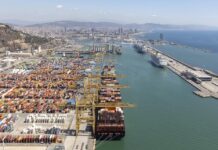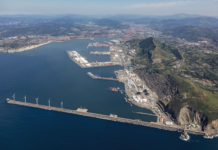Last week, the conference 2nd Baltic Ports and Shipping 2018 organised by the Freeport of Riga Authority gathered world-level experts and professionals of the industry in Riga to discuss the most topical current issues and future challenges in the activities of ports, shipping and the effective provision of supply chains. The biggest challenges of the industry on both regional and global scale include the influence of geopolitical processes on international trade, fast development of digital technologies and modern transformation of ports from a simple place of cargo handling into a complex ecosystem with many diverse participants.
Ansis Zeltiņš, CEO of the Freeport of Riga, highlighted: “Modern ports are developing fast. Just a couple of decades ago, ports used to be rather confined territories where cargo was handled, whereas now a port means a complex ecosystem deeply integrated into the economy of the city and the country, which unites many parties involved and many areas of activity. Currently, the main challenge of a modern port, including the Port of Riga, is understanding how to re-orient from simple cargo handling to “smart” logistics in its operations”.
At the conference and the stands of the concurrently organised exhibition, there was an opportunity to find out about the strategies used by the authorities of Baltic ports and the solutions offered by the providers of shipping services to avoid losing the competition and make ports and logistics even “smarter”.
Digitalization is a concept which has become the most topical term in port business. Margus Vihman, Chief Commercial Officer of the Port of Tallinn, shared his opinion on digitalization: “In the upcoming three or four years, the port sector in Estonia will also be completely paper-free. It will be possible to perform all operations online. We see that in future these solutions could be applied in international logistics as well. For example, if cargo must be delivered from Belarus to Estonia via Latvia, the entire document circulation with involved railways, ports, customs and border guard authorities might occur electronically and online. It will be faster, cheaper and more effective”.
The main conclusion of the study “Brave New World? Container Transport in 2043” carried out by the leading international transport insurance company TT Clubis that the future will be digital. The study was carried out by surveying more than 30 leaders and experts of the industry, who are 100% sure that out of the four possible future scenarios, i.e., digital resurgence, digital destruction, third globalization wave and extinction of international trade, one of the two digital scenarios will be implemented.
The fact that digital online solutions have already been developed and are operating in the conservative shipping and transport carriage sector, was demonstrated at the conference 2nd Baltic Ports and Shipping 2018 by the representatives of the companies ShipNEXT and Varamar Group.In the cargo transport sector, it is already possible to use online solutions similar to Internet stores or Ubertaxi services.





